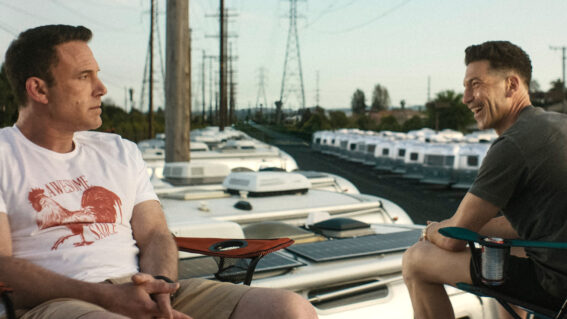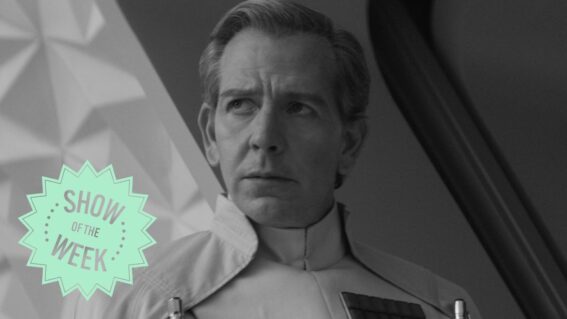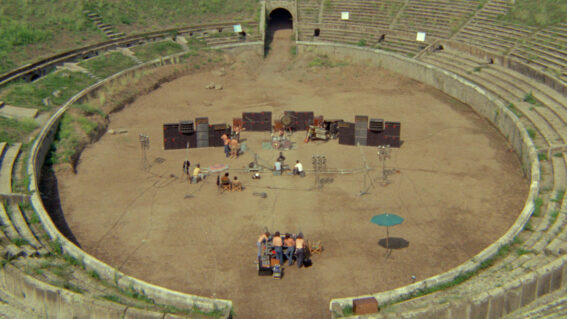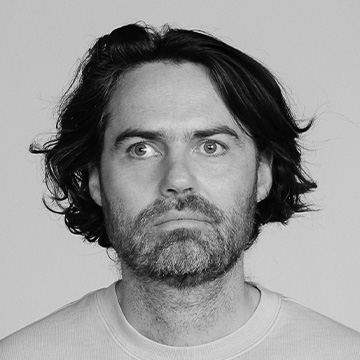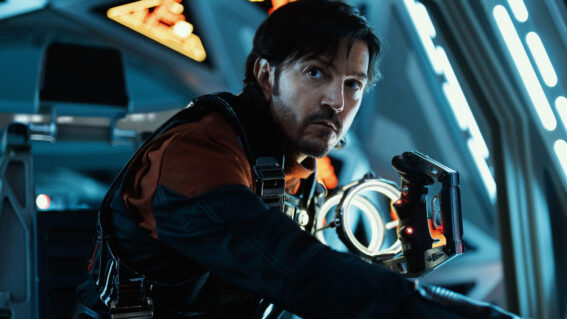“There’s nowhere to hide inside of Taskmaster,” Guy Montgomery tells us
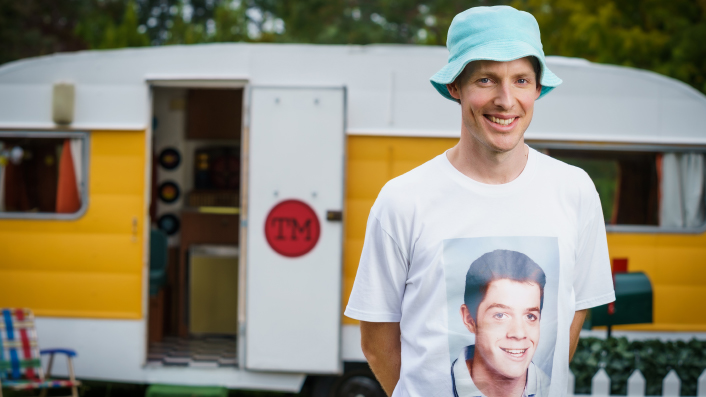
Our favourite absurd task-based competitive comedy show Taskmaster NZ returns for a new season (streaming on TVNZ On Demand and broadcast on TVNZ 2) starting Wednesday July 7. Contestant Guy Montgomery and Taskmaster Assistant Paul Williams joined Steve Newall for a chat.
“We’re about to do a live task,” says Jeremy Wells, “where our contestants find out how much trickier it is to compete in front of actual human beings with emotions—rather than just Paul Williams.”
The studio audience, of which I’m part, laughs approvingly at this low-level negging, having done so throughout this taping of Taskmaster‘s first season two episode. Not just approving laughter at the negging, though that’s all part of it. There’s also been plenty of enjoyment in seeing how the chemistry of this season’s contestants comes together as they jostle each other for Taskmaster Wells’s praise and/or for the benefit of those watching. And, of course, there are lot of laughs to be mined from their relative levels of success, failure, hilarity and humiliation in the show’s pre-recorded task-based segments.
See also:
* Movies now playing in cinemas
* All new streaming movies & series
If you’re not familiar with the show’s premise, Wells puts it succinctly: “These four award-winning comedians—and Matt Heath—have been completing tasks I set for them at our top-secret Taskmaster house.”
Those four award-winning comedians—Urzila Carlson, David Correos, Laura Daniel and Guy Montgomery—will spend a season competing for sometimes arbitrarily allocated points in this successful local version of the long-running and fucking brilliant UK series devised by Alex Horne and hosted by the inimitable Greg Davies.
And yes, Wells is correct in that they are also joined by Matt Heath in doing so.
The tasks will rely on everything from lateral thinking to hand-eye coordination, sheer cunning, mental endurance and the ability to correctly read a sentence. As for the outcomes, expect everything from abysmal failures to the highest levels of human achievement ever seen in responding to an absurd, largely pointless task. Essential viewing, in other words.
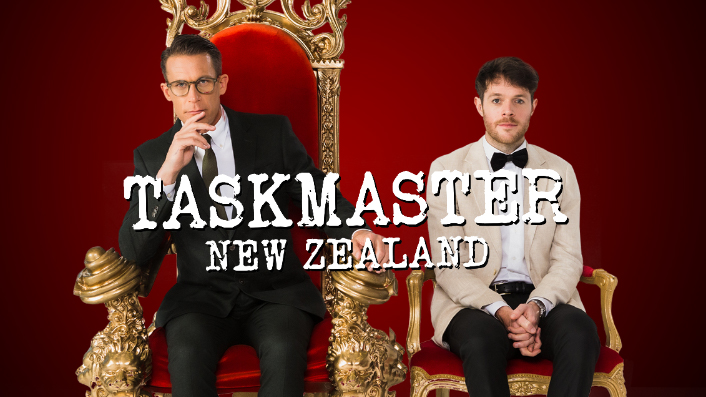
With season two about to hit screens, Guy Montgomery joined me for an in-depth Taskmaster chat. I started by asking him about perhaps the toughest Taskmaster task of all—keeping quiet about his involvement in the show, and its details, during and after production.
“I think it’s the most exciting and desirable job as a comedian in New Zealand—and the Commonwealth,” Montgomery says. “And so you do want to tell people… but you don’t. I mean, you can, but I respect the show so much, and discreetness or abiding with the show’s principles is such a vital part of the special sauce of the show—like not discussing with the other contestants what has happened before you watch the footage back. That’s one of the more challenging parts of the show because you’ve had these really odd experiences, and you just are dying to talk to anyone about what’s happened.”
“You sort of leave it on the paddock. At the end of every day, I wanted to journal what had happened, but then I thought, “No. I’m pretty sure that they’re filming all of this. This is being locked away for posterity.” It goes back to that reverence for the show and the format. And you know that the less you talk about it now, the more gratifying it will be when you finally get to.”
“It’s some sort of television equivalent of edging. And the rapturous orgasm is in front of a live studio audience in West Auckland.”
How to prepare for Taskmaster
One of the many joys of Taskmaster is watching contestants coming unglued onscreen. As much as we love to celebrate success, there’s the inevitability that everyone taking part is due to have at least one extremely unflattering, wheels-falling-off, disastrous flame-out. So (if indeed he did at all), how did Montgomery prepare?
“I rewatched a lot of Taskmaster, which was one of those things where you give yourself permission to do something you enjoy which is ostensibly for work,” he offers. “The idea that you’ll be good at the show, it’s not absurd, but so much of it is outside of your control. And so I tried to just create some sort of tendency for self-control or discipline inside of tasks, which was largely to go slow and give myself time.”
“I hate to admit that I’m competitive and I aim to win, but there’s sort of a thinking that was governing the performance on some tasks, which was even when you think it’s going abysmally, you still have to finish everything as best you can because you have no idea… One person might nail it, but three of the others might just totally bottle it. And across a season, it’s all about moderate points accumulation, so if you got three in every task, you’ve probably a chance to be near the front at some point.”
So, Montgomery repurposed patience and, dare I say, a degree of mindfulness as part of a strategy of being superior over other people?
“Yes,” he confirms. “I think I understand the sort of basis of meditation and I’m saying I use it for a feeling of superiority, but yeah, as I said, it sort of all does go out the window as soon as you’ve got a time-pressure task on your hands.”
The big choice – choosing what to wear
Over the years we’ve seen looks that were iconic, stylish, unflattering, or eyeball-searingly disturbing. With contestants sporting the same outfit for all their tasks throughout the season, clearly it’s a big decision.
“Choosing your task outfit is a lot of fun, and also, weirdly, it’s probably quite pressurised,” Montgomery confirms. “I’ve got my own style. I know what clothes I like to wear, but I don’t put a huge amount of pressure on myself to get it right. I trust my instincts. But to choose the right outfit for performing tasks felt very important to me. I wanted something light, agile, something that I felt comfortable in that I would wear in ordinary life but also slightly heightened, and I think I achieved that.”
“The T-shirt I wear for the tasks I sourced, specifically, from one of Paul Williams’ inner sanctum for the show. And that same source proved to be a treasure trove when it came to youthful images of Paul, and I thought it would be a wasted opportunity not to share that gift with the Taskmaster audience.”

Tackling the tricky tasks of Taskmaster
Even though we all should know better, it’s all too easy to sit on the couch watching Taskmaster and scoff “that won’t work” or “they should do this”. Of course, that’s singularly unhelpful, says Montgomery.
“The idea of watching from home and knowing exactly what you’d do and being able to see through the sort of opaque nature of some of the tasks, it all abandons you once you’re actually doing the task,” he says. “Once the task starts, you’re just a person in a room with no one except Paul Williams to talk to, a state of affairs I wouldn’t wish on anyone—and they’re filming you.”
Paul Williams finds himself with a sometimes uncomfortably close-up view of the extremes of the human psyche as the Taskmaster’s Assistant. As he explains to us, even as someone involved in preparing the tasks, the results proved unpredictable.
“In terms of just the tasks, yeah, you’ve got no idea,” says Williams. “So often a task on paper will be my favourite task, and there’ll be another one where I’m like, “That one’s OK…” And then the one that I was lukewarm on ends up being one of the best tasks because they’ve done something that you yourself couldn’t see.”
Not only did responses to tasks prove unpredictable, but as Williams puts it, there was also the potential to be unexpectedly therapeutic.
“Urzila kept talking about she was finding it some sort of weird therapy,” he says, “where she was learning a lot about herself through how she was responding to the tasks, which is really funny. But, yeah, it’s super interesting. Sometimes I just feel like I’m analysing how people’s brains work or something.”
Having watched plenty of people losing the plot on the show over the years, I wondered if Montgomery was aware also aware, when his own brain wasn’t working too well, that this would be the stuff that’s going to make the edit—and for us to find hilarious at home. Were there times when he would think “Oh, fuck, that’s going to be in..”?
“Sort of,” he says. “I mean, a huge part of doing the show is letting go, and you trust the infrastructure of the show… there’s nowhere to hide inside of Taskmaster.”
“Obviously, you want to do well, and obviously, you want to be funny—it’s a comedy show—but the only way to be funny is to just perform the task to the best of your ability. And if the best of your ability on any given task is awful, that’s probably going to be funnier than if you do well.”
Competing for the Taskmaster’s favour
As has been well-established in other seasons of Taskmaster both here and in the UK, the in-studio scrap for points can result in some of the contestants’ most craven and competitive moments. But, in Jeremy Wells, these five often-desperate individuals find themselves at the mercy of someone who has the potential to rate their efforts uncharitably, and shows little tolerance for bullshit. You certainly wouldn’t want this to be your murder trial.
“You do, in your head, have certain tasks or moments in mind when you think you really shone,” says Montgomery, “and Jeremy can offhandedly say, “Not for me.” And in those instances, you do get a kind of desperate feeling of wanting to say, “No, you don’t understand.” But everyone’s got to have their turn to talk, and you’ve kind of got to pick your spots or moments when you really want to go in there.”
“And also, there’s the temptation to pillory or try and bury other people’s performances or submissions with respect to prize tasks, and even then, you have to pick your spots because you don’t want to make a menace of yourself to your fellow contestants or to the audience in the studio or at home.’
“This year especially, they were really trying to argue their case with him which I think is great,” says Williams. “And it’s cool because, obviously, Jeremy, for a lot of us, is kind of a legend in New Zealand comedy in terms of Eating Media Lunch was so influential for a lot of us. So Jeremy definitely does have this power which I think is perfect for Taskmaster because everyone respects him and is quite scared of him. I think that’s the vibe—at least it is for me.”
“It became apparent quite quickly that everyone was quite competitive”, continues Montgomery. “And so, I think the way that that manifested was that there was almost a sibling-like energy, a really wonderful sort of bickering quality to the way that we’d talk to and about each other, and a sort of pleading to Jeremy to be merciful towards us and ruthless towards other contestants. And you’ve got no idea how it’s all going to shake out.”
This season’s contestants
The mix of “these four award-winning comedians—and Matt Heath” should prove a winning combination for viewers from the opening minutes of Taskmaster‘s first episode. “I think they’re going to fall in love with, basically, all of them,” says Williams. “Yeah, everyone was so different”.
Read on as Guy Montgomery and Paul Williams break down this season’s Taskmaster contestants one by one.

Urzila Carlson
GUY MONTGOMERY: “Urzila’s energy almost overrode the tasks. I don’t think she would think through progressions of how she could interpret something. I think she’d see it, she’d do it, she would bully Paul in some hilarious way, and then she would walk away. There was sort of a bit of that there. It was just like, “Here it is. Here’s what I’m going to do.””
PAUL WILLIAMS: “Urzila’s obviously, I’d say the biggest star. The most well-known. But we’re seeing her in a completely different environment to where anyone’s seen her before… Usually, she’d do a panel show or people just know her from her stand up specials on Netflix, but obviously, this is so completely different and it’s really funny to see her in that situation.”

David Correos
GUY MONTGOMERY: “David Correos. I mean, his mind functions differently from possibly anyone I’ve met, which, in a show like Taskmaster, is a tremendous asset, both in interpretation and execution—which works for and against him. He will interpret some tasks in a way that I could never have conceived. Even in his live comedy performances, he’s displayed a willingness to put his body on the line in a way that is highly unusual for not just a comedian but sort of anyone.”
“But he’s also liable to become flustered, and so if a task or some sort of performance within a task is not going exactly as he might hope, there’s no artifice, no ability to disguise how he feels about what’s happening.”
PAUL WILLIAMS: “David Correos is just an absolute loose cannon. I think people are going to love him because he’s so high. He does everything at 100. He never cuts corners, which I think is perfect for the show and he always goes big. And so he’s really great on the show.”
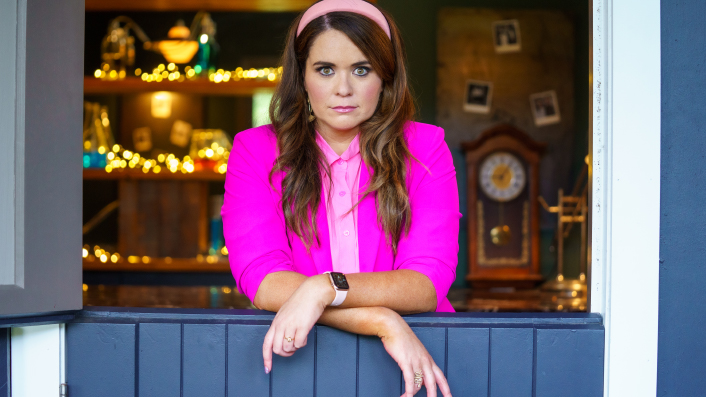
Laura Daniel
GUY MONTGOMERY: “Laura brings an exceptional ability to go big, to see opportunity on a scale that, again, is beyond me. Again, it’s a massive asset in tasks. If you can look at a task and exit the limitations of your brain and visualise it on a larger scale, as large a scale as can be afforded by the crew that’s on set that day or that can be captured, it’s great.”
“Also, I thought she was really consistent. I would say everyone was competitive, but I would say Laura and I, arguably, were maybe the most competitive, and so there was a level of consistency to her sort of application in tasks. So David, for example, I’d say, would oscillate more between brilliant sort of genius-level ability to perform a task and, using the same sort of brain that brought him to that place, also catastrophic failures or catastrophic spirals. But Laura just seemed to be on the level.”
PAUL WILLIAMS: “Laura, she’s super smart and you could tell that she had wanted to do this for a long time. She’s very competitive as well. I play board games with her and she’s such a sweet and lovely person and then she can be quite kind of cunning and competitive which is great.”

Matt Heath
GUY MONTGOMERY: “Matt Heath, I think, was quite wilfully ignorant going into the show. I don’t know that he was especially familiar with the show and he did an abysmal job of reading the fine print on several tasks and so would just sort of bumble through some of them, doing his best. My understanding of Matt is that he prefers to have an element of control over the different constituent parts of what’s happening, which is not exactly how you want to approach Taskmaster. So I think he was really funny.”
PAUL WILLIAMS: Matt… he actually reminds me a bit of myself. I always think I kind of got to 13 and that’s when I stopped maturing. And Matt, he’s a bit the same. I think we got on quite well because of that. He’s just really into fun stuff, yeah. That’s not a great way to pitch him, “he’s into fun stuff!” [laughs]. Matt’s really into fun stuff, but, yeah, he’s charismatic and he’s great.”

Guy Montgomery
GUY MONTGOMERY: “I think he acquits himself quite well. I understand he’s a big fan, a long-held dream to be able to appear on Taskmaster. And in that respect, I think, you only get to do it once, and there are certain performances in certain tasks that I think he would change, but holistically, I think he’ll be very happy with his performance on tasks and in the studio.”
PAUL WILLIAMS: “Guy Montgomery, who you’ve obviously spoken to, I think he’d just be perfect for this just because he’s a really clever guy and I always think his greatest strength is just talking. He’s a real wizard with words which I thought, regardless of how he does in the tasks, he’s going to be great in the studio because he’s so good at talking.”


